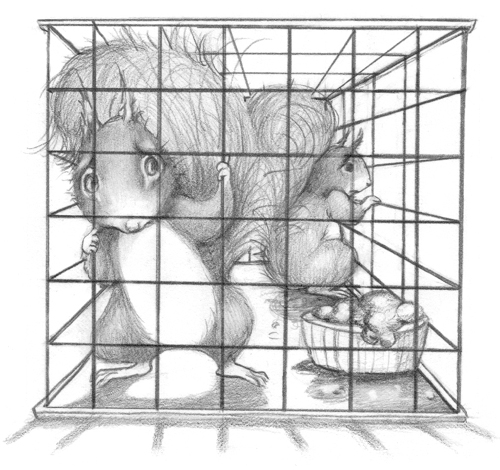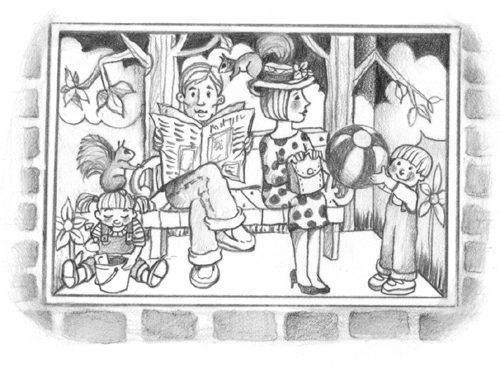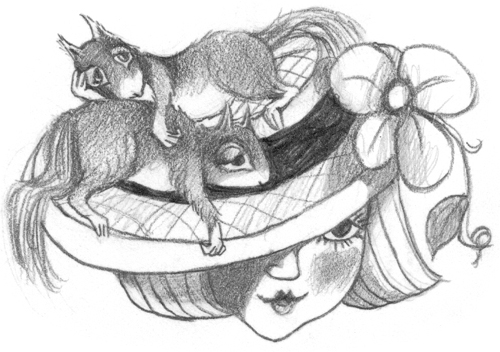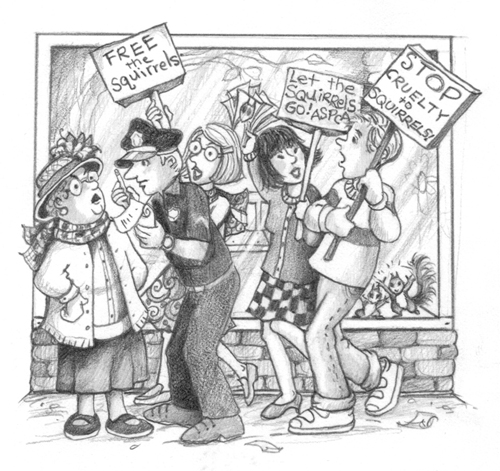Squirrel World (5 page)
Authors: Johanna Hurwitz
Trapped

Since we couldn’t escape, we did the only sensible thing we could, which was to curl up and go to sleep. With a good rest behind us, we’d both be able to think better.
We woke to the sound of human voices and to the sensation of human hands in thick gloves lifting us up and putting us into a closed box with mesh sides. I ran around in a panic.
I could look out of the box, but there was no way to get out.
“Stop! I smell something good!” shouted Lenox with excitement.
I stopped and took a deep breath. “I do too,” I said.
We ran toward the scent, which was like peanuts but even stronger and better. “It’s like smashed peanuts,” Lenox said, eating something he found in the corner of the box. “And it’s delicious. I love it.”
He was right. It was delicious. But though I was very hungry, I still was sharp enough to realize we were in a terrible situation. “Don’t you see what has happened?” I cried out in despair.
Lenox looked up, his mouth covered with the tan peanut paste. He licked it from his
lips. He looked around for the first time. “We’re in a cage!” he cried out. “Look what you did. You got us trapped inside a cage.”

Lenox and I ran round and round the mesh cage that we found ourselves in. Never mind that at one end the delicious peanut smell was wafting over us. A cage is the worst possible place that a squirrel can be. There had to be a way for us to get out.
And if there wasn’t a way out, what did the humans plan to do with us?
Eventually we were both exhausted. We had to stop, and while we caught our breath, I finally could overhear talk of the proposed scheme for Lenox and me.
“They belong in a park,” a man’s voice said with certainty.
“Yes, but I’ve come up with a better idea. In fact, it’s an extraordinary one,” said another voice.
“What’s that?”
“You know the display that our window decorators have just set up? It’s a park scene with mannequins, plants, and fake birds. Imagine if we had
real
squirrels running up and down the plants. People would flock to see our windows. It would be fantastic.
Better than Bloomingdale’s. Better than Lord and Taylor. Better than Macy’s. Our window would be better than any of those windows with mechanical objects. This would be
real
. We can call it Squirrel World.”
“Do you really think people will stop and look at our windows?” another man asked.
“Of course. Haven’t you ever walked past that pet shop on Sixtieth Street? There’s always a crowd admiring the dogs in the window. Imagine the people looking at our squirrels. It would be fantastic. And after they finished looking at the windows, they’d come inside and shop. That’s what it’s all about: attracting customers to buy our Nu-Tru Styles.”
Nu-Tru Styles
. I shuddered when I heard those words. I’d once overheard one human
tell another that a little learning is a dangerous thing. My little bit of learning had misled me to believe that this was a store that sold nuts. How could I have been so dumb?
The two men continued their talking. I grew tired trying to follow all they had to say. Finally, despite my fears, my hunger got the better of me, and I began nibbling again at the peanut paste. It was sticky stuff, almost as if someone had pre-chewed it for us. It was good, but nothing could be good enough to make up for being in a cage.
Eventually Lenox and I were let out of the cage. For one glorious moment, I thought we were free. But then I realized we had traded one cage for another. In place of the small mesh cage, we were now in a much larger space, which looked out onto Lexington
Avenue. I made a flying leap and hit my head on an invisible barrier. It was clear glass, the same stuff that they use for car and bus windows. Stunned, I lay on the ground. It seemed to be earth, but actually it was some sort of imitation, made out of paper.
I looked around me. It appeared that we were inside the park. There was a bench with a pair of humans sitting on it. One was holding a newspaper and reading. Nearby
were two children who appeared to be playing. One had a ball, and the other had a pail and shovel. I watched them. No one moved. Not a breath, not a blink. I stared at the large humans. The man never turned a page in his paper, and the woman never glanced at the children. Time passed, and the children never dug in the dirt or whined for ice cream.

I climbed up a tree, but it wasn’t a true tree, made of wood and bark. I chewed on a leaf, and it tasted like paper. In fact, it was paper. I jumped over to another tree. Perhaps that one would be better. It wasn’t. Nothing smelled or tasted or felt as it should inside this huge cage.
“Oh, Lenox,” I sighed aloud. “What have we gotten ourselves into? There is nothing real in this place but us.”
“Squirrel World”

What followed were days of captivity inside the fake world. I suppose to some it might have seemed glorious. Without the slightest effort on our part, our hunger and thirst were satisfied. Ample amounts of food and water were provided. Each morning, fresh supplies of peanuts were thrown at us. There were enough to keep us well fed all day long.
But gradually we grew bored with the sameness of our diet.
I also suddenly understood what my mother had meant when she said,
“If you don’t put in a day’s work, you will not find fun in your day.”
Though we had nothing to do but eat and chase each other, I grew more and more restless. There was not much satisfaction or triumph in finding food when I didn’t have to look for it. Furthermore, large as this new cage was, it could not compare with our home in the park. Lenox and I ran up and down the phony trees, chasing each other, but we had no other squirrels to play with.
There was constant sunshine, always coming from the same angle, until it suddenly went out at night. I had never realized how much I loved the variety of weather.
Here it never rained. There were no breezes. Even worse, there were no birds or insects or any other life at all. Just Lenox and me running around and getting more and more bored with each other and our limited existence.
It reminded me of something, and I confess I was slow to realize what it was. “We are just like creatures in the park zoo,” I gasped when it finally dawned on me. “This is what it must be like for them.”
“Yes. And you got us into this situation,” Lenox berated me over and over again, once he tired of our life in the store window.
It was no use reminding him that this expedition to Lexington Avenue had been his idea. Who knew
that Blooming Vales had only fake flowers in bloom? Who knew that Nu-Tru Styles was a prison? Who knew that we would end up trapped in a cage with humans? Humans who weren’t even real!
When we became too bored to run around, we looked out at the people who were looking at us. Men, women, and children stood in rapt amazement, watching us. Yes, indeed, it was exactly like being an animal in the zoo.
In fact, I don’t remember ever seeing such mobs around a single zoo cage. Big and small humans pressed their noses to the window. After a while, we noticed that there were many humans marching back and forth, holding big sticks attached to cardboard signs with messages written on them. I could read some of the letters: A-S-P-C-A. I had no idea what those letters spelled. I certainly needed more lessons from PeeWee.
But I feared I’d never see him or my squirrel family in the park ever again.

Sometimes police officers in their blue uniforms would argue with the people. We couldn’t hear what they said, but we obviously were the focus of everyone’s attention.
I tapped on the glass window, and I could see that the people were delighted. Immediately someone tapped back.
“Fools!” I called to the humans. “If you want to see trees and squirrels, go to the park.”
But they paid no attention. During the course of the day, more and more people stood spellbound. Sometimes bright lights flashed at us as people with cameras took our picture. I thought of the millions of times I had watched humans taking pictures of one another in the park. Some of the cameras spit out the picture at once, so over the years I have seen some of the results. Often people leave the pictures on park benches or in the trash cans. Blurred copies of nature, totally inedible. They serve no purpose at all.
When the sun went off at nighttime, Lenox and I stopped performing. We sat under the phony trees and discussed our
situation. “If only we could find a way out,” he said to me.
But we had searched every corner of our cage, and there seemed to be no crack or hole. There was a sliding door that opened briefly every morning, when the day’s supply of food and water was left for us. But it all happened so quickly that there was no way for us to make a break for it. And if we did, then what? We would end up back inside the store. We’d once again be running away from all those people who had chased us before.
Occasionally a pigeon or two walked past the window. I tried to attract their attention. Maybe they would fly to the park and get some of our family to help us. But even when I tapped at the pigeons, they just looked up
and then away. They seemed to care only about food. They didn’t care about trapped squirrels.
“I hate it here,” said Lenox. Had he told me that a hundred times? Or was it two hundred?
I totally agreed with him, but I didn’t tell him that. What was the point of it? I tried to think of the good things about our situation. We were safe. Dogs passed by all day long. Some of them pulled at their leashes and tried to get through the window, but they couldn’t. They growled and pressed their muzzles against the glass, but they couldn’t reach us. In the park, we often had to run from dogs that got free from their owners. I know of more than one squirrel
who found himself or herself between the jaws of an unleashed dog.
There was another good thing about our situation: We had food. There was no doubt where our next meal was coming from. There was also no doubt what our next meal would be. That made it boring, of course. There’s excitement and surprise when you go off looking for food. True, on some days we find more and better meals than on others. But now I yearned for a day of digging and scratching and hunting for food. An empty stomach back home was better than a meal in this prison.